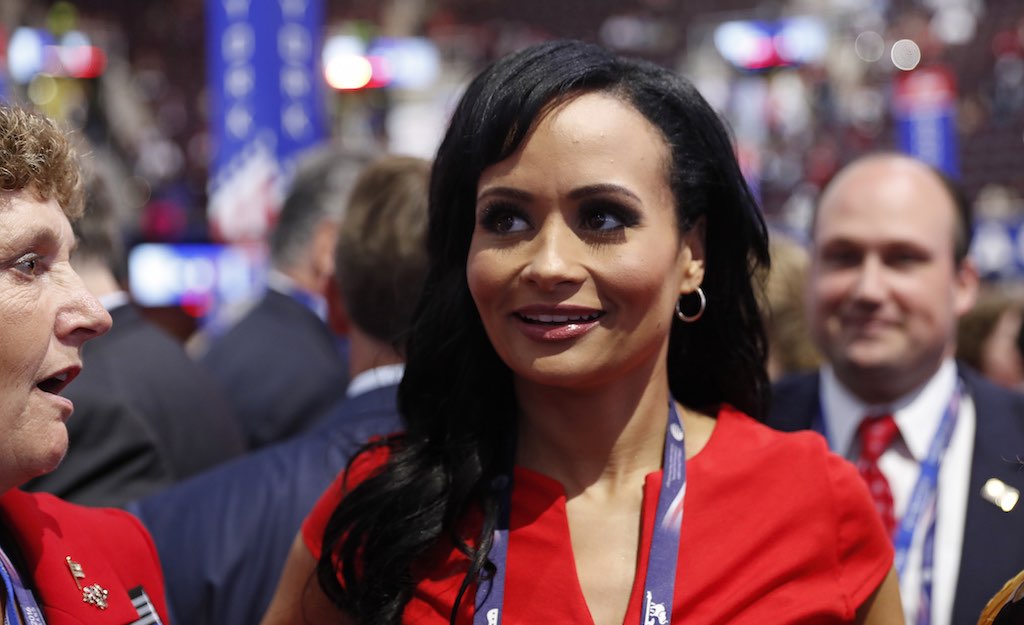On the eve of President Trump’s joint address to Congress, Katrina Pierson strolls into the Trump Hotel lobby, her face buried in her gold bedazzled phone. She’s just arrived from a Fox News hit, and the suit-clad men gathered at the bar, sipping Manhattans, notice. They gesture at the television then back to her, as if Pierson has literally just stepped out of the screen.
When she joins me at our table at BLT Prime, a busboy hurries over, asks if we’re ready to order.
“Oh, yeah,” she says breezily, shrugging out of her black leather jacket. “You can send Josh over.”
It’s unsurprising that our fellow patrons immediately lean back in their chairs, arch their necks to get a better look. Pierson was, after all, the now-president’s most prolific spokesman on the campaign trail. At times she’d shuttle through as many as 15 cable news segments a day, most of them from a makeshift studio in her Texas home. For every setback on the trail—Corey Lewandowski’s alleged assault on a female reporter, the Access Hollywood tape—Pierson was ready with a full-court press. She prided herself on being with Trump from that fateful escalator descent all the way to November 8. “When he won,” Pierson says, “I felt vindicated.”
But the election has come and gone, and last anyone heard, Pierson was lobbying hard for a spot in the White House press shop. That didn’t happen, of course, and Pierson now finds herself helping run America First Policies, the nonprofit ostensibly organized to promote Trump’s agenda. The group has had little discernible movement since its launch in January and has only now, Pierson says, settled on a location for its headquarters (she can’t remember exactly where it is). She admits the group hasn’t “done anything exciting yet,” but, with a flourish that would make her former boss glow, she says it has “some opportunities to do some really great things in the future.”
It’s all terrifically vague and unglamorous for someone who once championed her role as team Trump’s most visible player. Yet Pierson swears she’s exactly where she wants to be.
“All of our grassroots voters, they know me. So I felt like, I gotta stay with the people,” rather than go into the White House, Pierson says. “And I know it was the right decision.”
Pierson says she decided to join the America First Policies crew at the start of the new year, just weeks before she and five other Trump campaign veterans announced its launch on January 30. The nonprofit includes Rick Gates and David Bossie, both former deputy campaign managers; Nick Ayers and Marty Obst, both former advisers to Vice President Mike Pence; and Brad Parscale, previously the campaign’s data director.
The rollout was quiet. Few details were revealed beyond the group’s masthead, but the conceit was simple: to spearhead a well-oiled operation that would help Trump deliver on his legislative agenda, from Obamacare to immigration to trade. It would mirror the nonprofit founded by President Obama’s first campaign manager, David Plouffe, in the wake of Obama’s 2008 victory. But whereas Plouffe’s outfit served as something of an extension of the Democratic National Committee, Pierson says that America First will readily attack Republicans if needed. “If [Speaker] Paul Ryan is blocking something that’s important to the president,” she says, “we’re going to talk about that.”
That the group managed to cobble together a leadership structure was an accomplishment in itself. Many of Trump’s top aides, including Kellyanne Conway, expressed an interest in building out the nonprofit the day after Trump was elected. Republican megadonor Rebekah Mercer, the most influential booster in Trump’s orbit, considered providing the bulk of funding. But for weeks the group was stymied by internal bickering, which reached a peak in late December, when Mercer and Parscale clashed over whose data firm would service the nonprofit. The fight ended, a source told The Daily Beast, with Mercer demanding to see Parscale’s tax returns, questioning his firm’s large financial haul during the campaign. “It was a disaster of a meeting and Bekah walked out and she took her contributors with her,” the source said.
Pierson’s own path to the group was rocky. Initially, she planned to go into the White House. Trump “wanted me there, and I wanted to be there,” she says. She recalls an early post-election meeting in Trump Tower in Manhattan, where she says she told Trump, “Surely I’m being considered for something.”
“We’re just laughing about it, and Reince [Priebus] says, ‘Oh, yeah, yeah, definitely.’ And of course Trump is like, ‘Oh, yeah, she’s been with me from the beginning.’”
So what happened? Pierson says she was offered the role of deputy press secretary. She accepted it, she says. But then she backed out. “It was funny because, I think it might have been a week later…I called ‘em up and said, ‘You know, I’ve been thinking about it, and I think I’m gonna go over to the c4.’” (America First is organized under section 501 (c)(4) of the IRS Code, which allows a nonprofit to engage in some political activities.) Pierson insists that it was her decision alone. “I talked to…staff, who were very disappointed,” she says. “But they understood. Everybody said, ‘Do what you feel is in your heart.’”
The White House did not return emails asking to confirm this chain of events. But a senior campaign official who’s close with Pierson says that Pierson lost the deputy press secretary post “on her own accord.” The source says that Pierson was “pissed” that she wasn’t tapped instead for press secretary: “I love Katrina, but she was bitching to everyone that they should have chosen her and not Sean [Spicer],” the source says. “It got back to Jared [Kushner] and Reince. And they ultimately decided they just didn’t want to deal with that sort of drama. So they ‘placed’ her in the c4.” The position was ultimately given to former campaign aide Sarah Sanders.
Nevertheless, Pierson reiterates several times that she feels better equipped to serve Trump from the outside, “fighting the media” and “building out his grassroots.” Yet it’s tough to conclude that America First is actively doing either. According to a source familiar with the group’s inner workings, they’ve failed to land many high-profile donors thus far. “They’re trying to go around to all of these big donors and aren’t having much success,” the source says. “It’s bizarre to me, because they have a donor list. All they’ve gotta do is write up a solicitation, have Donald Trump Jr. sign it and mail it, and they’ll make millions. I don’t know why they aren’t doing that.”
Pierson waves off that criticism. “We have several donors who want to see the president be successful,” she says.
As for the notion that America First isn’t really doing much, Pierson says nothing could be further from the truth. They’re currently “advocating,” she says, and “correcting the narrative.” I ask her how exactly that’s taking shape. “Well,” she says, “I just went on TV tonight. I’ll be doing speaking engagements.”
“We’re definitely gonna have ads. Which is gonna help,” she continues. “So we’ll have ads, we will continue to do media. For sure. I guess all the normal stuff that a c4 would do.” At the time, she told me to expect their first television ad to drop on Wednesday or Thursday of last week, but I was never able to find it. (In an email Friday, she assured me: “The ad is great. I’m not in DC right now, but it’s coming.”)
Otherwise, she says the group has no specific timeline in mind. “Not yet. Everything is in its own little bucket, and in time, it’ll roll out.”
Regardless of whether America First is accomplishing anything, Pierson seems to be having the time of her life. After the election, she eliminated the stress of appearing on networks other than Fox. “I finally just stopped doing CNN. It was unnecessary,” she says. “I would occasionally do CBS if they called, because I know the producer and they’re not horrible. I just refused to have to go on another network and be subject to unfair criticism.” And why should she? Her ultimate goal, she says, “is to retire somewhere and sit on the beach.” The in-between is just filler. “I see myself being at the c4 for awhile, maybe going into the administration, maybe not. Maybe going into the reelect.”
“I don’t really plan anymore. You know, I didn’t plan any of this,” she says. She gestures around us at the ornate expanse of the lobby. “But I guess God had a different plan for me.”
As long as people still recognize her, she’ll feel just fine. And they do. After we say goodbye, I run into Dog the Bounty Hunter and Lee Stranahan, an investigative reporter for Breitbart, who’ve just entered the hotel.
Stranahan excitedly tells me that he’s here to interview Dog. But then he looks out toward the middle of the lobby, where Pierson’s silhouette is unmistakable, her black hair and black skinny jeans and black pumps. His eyes widen. “Katrina’s here?” he gasps with delight. Before I can respond, he sprints off to meet her.



















